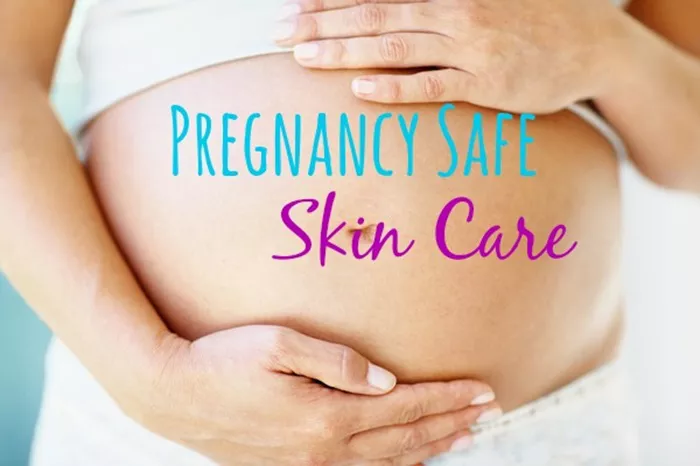Pregnancy is a time of profound physical and hormonal changes that can significantly impact a woman’s skin. The heightened levels of hormones, particularly estrogen and progesterone, can lead to various skin conditions, from acne to hyperpigmentation. It is essential for expectant mothers to adapt their skincare routines to address these changes while ensuring the safety of their developing baby. This article provides a comprehensive guide to safe and effective skincare during pregnancy, highlighting ingredients to avoid, beneficial skincare practices, and specific recommendations for common pregnancy-related skin issues.
Understanding Skin Changes During Pregnancy
Pregnancy can bring about a range of skin changes, some of which are welcome, and others that might be more challenging to manage. Understanding these changes is the first step in creating a suitable skincare routine.
Hormonal Fluctuations and Their Effects
The increased levels of hormones during pregnancy can cause several skin changes, including:
Increased Sebum Production: Leading to pregnancy-related acne.
Hyperpigmentation: Known as melasma or the “mask of pregnancy,” characterized by dark patches on the face.
Stretch Marks: Resulting from the stretching of the skin due to weight gain and growth of the baby.
Skin Sensitivity: Heightened sensitivity can lead to irritation and allergic reactions to previously tolerated products.
Ingredients to Avoid During Pregnancy
Certain skincare ingredients can pose risks to the developing fetus and should be avoided during pregnancy. It is crucial to read product labels and consult with a healthcare provider when in doubt.
Retinoids
Retinoids, including retinol and retinoic acid, are derivatives of vitamin A and are commonly used in anti-aging products. However, high doses of vitamin A can cause birth defects, making retinoids unsafe for use during pregnancy.
Salicylic Acid
Salicylic acid, a beta hydroxy acid (BHA), is effective for treating acne but should be used with caution. High doses, particularly in oral form, have been associated with pregnancy complications. Topical use in low concentrations (below 2%) is generally considered safe, but it is best to consult with a healthcare provider.
Hydroquinone
Hydroquinone is used for treating hyperpigmentation but is not recommended during pregnancy due to its high absorption rate and potential risks to the fetus.
Phthalates
Phthalates, commonly found in fragrances and plastics, have been linked to developmental and reproductive toxicity. Opt for phthalate-free products to minimize exposure.
Formaldehyde and Formaldehyde Releasers
These preservatives, found in some cosmetics and nail products, are known carcinogens and should be avoided during pregnancy.
Chemical Sunscreens
Certain chemical sunscreen ingredients, such as oxybenzone, have been linked to hormonal disruptions. Physical (mineral) sunscreens containing zinc oxide or titanium dioxide are safer alternatives.
Safe and Beneficial Skincare Ingredients
Several skincare ingredients are considered safe for use during pregnancy and can effectively address common skin concerns.
Hyaluronic Acid
Hyaluronic acid is a powerful hydrating ingredient that can help maintain moisture levels in the skin without posing any risks to the fetus. It is suitable for all skin types, including sensitive skin.
Vitamin C
Vitamin C is a potent antioxidant that can brighten the skin, reduce hyperpigmentation, and promote collagen production. It is safe for use during pregnancy and can be incorporated into a morning skincare routine.
Glycolic Acid
Glycolic acid, an alpha hydroxy acid (AHA), is effective for exfoliating the skin and treating acne. It is considered safe for use during pregnancy in low concentrations (below 10%).
Niacinamide
Niacinamide, also known as vitamin B3, offers multiple skin benefits, including reducing inflammation, improving skin elasticity, and brightening dark spots. It is safe for use during pregnancy and suitable for sensitive skin.
Ceramides
Ceramides are lipids that help maintain the skin’s barrier function, preventing moisture loss and protecting against irritants. They are safe and beneficial for dry and sensitive skin during pregnancy.
Creating a Pregnancy-Safe Skincare Routine
A well-structured skincare routine can help manage pregnancy-related skin changes while ensuring the safety of both mother and baby. Here is a step-by-step guide to a pregnancy-safe skincare routine.
Cleansing
Choose a gentle, sulfate-free cleanser to remove impurities without stripping the skin of its natural oils. Look for cleansers with soothing ingredients like chamomile or aloe vera.
Toning
Use an alcohol-free toner to balance the skin’s pH levels and provide additional hydration. Ingredients like rose water and witch hazel are gentle and effective.
See Also: When Should I Gua Sha in My Skincare Routine: A Full Guide
Moisturizing
Hydration is crucial during pregnancy to maintain the skin’s elasticity and prevent dryness. Choose a moisturizer rich in hyaluronic acid, ceramides, and glycerin to lock in moisture and support the skin barrier.
Sun Protection
Daily sun protection is essential to prevent hyperpigmentation and protect against harmful UV rays. Opt for a broad-spectrum physical sunscreen with an SPF of at least 30. Reapply every two hours when exposed to the sun.
Treatments and Serums
Incorporate pregnancy-safe serums and treatments to address specific skin concerns. Vitamin C serums can brighten and even out skin tone, while niacinamide can reduce inflammation and improve skin texture.
Addressing Common Pregnancy-Related Skin Issues
Pregnancy can exacerbate certain skin conditions or bring about new ones. Here are some common pregnancy-related skin issues and how to manage them safely.
Pregnancy Acne
Acne can be a significant concern during pregnancy due to hormonal changes. To manage pregnancy acne:
Cleanse Gently: Use a mild cleanser twice a day to remove excess oil and prevent clogged pores.
Spot Treatments: Apply spot treatments containing benzoyl peroxide or sulfur, which are considered safe for use during pregnancy.
Avoid Irritants: Steer clear of harsh exfoliants and astringents that can exacerbate acne.
Hyperpigmentation (Melasma)
Hyperpigmentation, particularly melasma, is common during pregnancy. To manage hyperpigmentation:
Sun Protection: Use a broad-spectrum sunscreen daily to prevent dark spots from worsening.
Vitamin C: Incorporate a vitamin C serum to brighten and even out skin tone.
Niacinamide: Use products containing niacinamide to reduce the appearance of dark spots.
Stretch Marks
Stretch marks are a common concern during pregnancy as the skin stretches to accommodate the growing baby. To prevent and minimize stretch marks:
Moisturize Regularly: Apply a rich, hydrating moisturizer or body oil to areas prone to stretch marks, such as the abdomen, breasts, and thighs.
Massage: Gently massage the moisturizer into the skin to improve circulation and promote elasticity.
Stay Hydrated: Drink plenty of water to keep the skin hydrated from within.
Skin Sensitivity and Irritation
Pregnancy can make the skin more sensitive and prone to irritation. To soothe sensitive skin:
Choose Gentle Products: Opt for fragrance-free, hypoallergenic products formulated for sensitive skin.
Avoid Harsh Ingredients: Steer clear of products with alcohol, synthetic fragrances, and strong exfoliants.
Soothe with Aloe Vera: Use products containing aloe vera or chamomile to calm irritated skin.
The Role of Nutrition in Skincare During Pregnancy
Nutrition plays a vital role in maintaining healthy skin during pregnancy. A balanced diet rich in vitamins and minerals can support skin health and improve its appearance.
Hydration
Staying hydrated is essential for overall health and skin elasticity. Aim to drink at least 8-10 glasses of water daily to keep the skin hydrated and supple.
Vitamins and Minerals
Certain vitamins and minerals are particularly beneficial for skin health during pregnancy:
Vitamin E: Found in nuts, seeds, and leafy greens, vitamin E helps protect the skin from oxidative stress.
Vitamin C: Citrus fruits, strawberries, and bell peppers are rich in vitamin C, which supports collagen production and brightens the skin.
Omega-3 Fatty Acids: Found in fish, flaxseeds, and walnuts, omega-3 fatty acids help maintain the skin’s barrier function and reduce inflammation.
Folic Acid
Folic acid, essential for fetal development, is also beneficial for skin health. Leafy greens, citrus fruits, and fortified cereals are excellent sources of folic acid.
Consulting with a Dermatologist
While many skincare products are safe for use during pregnancy, it is always best to consult with a dermatologist before starting any new skincare regimen. A dermatologist can provide personalized recommendations based on your skin type and specific concerns, ensuring the safety and effectiveness of your skincare routine.
Patch Testing
Before using any new skincare product, perform a patch test to check for allergic reactions or irritation. Apply a small amount of the product to a discreet area of skin and wait 24-48 hours to see if any adverse reactions occur.
Postpartum Skincare
Skincare concerns may continue or change after childbirth. Maintaining a skincare routine postpartum can help address lingering issues and support the skin’s recovery.
Hormonal Adjustments
As hormone levels adjust postpartum, skin conditions such as acne or hyperpigmentation may persist or improve. Continue using gentle, safe skincare products during this period.
Stretch Mark Treatment
Stretch marks may remain after pregnancy. Treatments such as laser therapy, microneedling, or topical retinoids (once breastfeeding is completed) can help reduce their appearance.
Hydration and Moisture
Keep the skin hydrated and moisturized postpartum, especially if breastfeeding, which can lead to increased fluid loss.
Conclusion
Pregnancy is a time of significant change, and the skin often reflects these changes. By choosing safe and effective skincare products and practices, expectant mothers can maintain healthy, glowing skin while ensuring the safety of their developing baby. Avoiding harmful ingredients, incorporating beneficial ones, and consulting with healthcare providers are essential steps in creating a pregnancy-safe skincare routine. With the right care, the journey to motherhood can be a time of radiant beauty and well-being.
[inline_related_posts title=”You Might Be Interested In” title_align=”left” style=”list” number=”6″ align=”none” ids=”11068,10964,10929″ by=”categories” orderby=”rand” order=”DESC” hide_thumb=”no” thumb_right=”no” views=”no” date=”yes” grid_columns=”2″ post_type=”” tax=””]


































